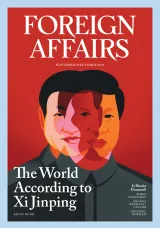編輯器
FA: 習近平和「權力悖論」

新一屆政治局
一個空虛的強者?
An empty strongman?

作者/Author(s): Minxin Pei
網站來源/Source: Foreign Affairs
日期/Date: 11/21/2022
主題/Key Topics : Ideology
摘要:
與 1969 年的毛澤東一樣,習近平在二十大上透過打擊其他派的對手,進一步鞏固了他的權力。然而,毛澤東去世後的中國歷史發展就是血淋淋的教訓。習近平的行動若從前述事件來看,可能會使中共更容易受到其忠誠黨員之間的政治鬥爭影響,他們可能會為繼任而戰,而無法解決中國當前的國內和國際需求。
1969年中共九大後的情況
- 雖然毛澤東任命林彪為其繼位者,但他的偏執狂迫使他削減了林彪的影響力,最終導致林彪於 1971 年去世。
- 毛澤東的健康狀況每況愈下,在未能解釋他的政治願景並且找不到合適的繼任者之後,他再也沒有恢復過自己的政治影響力。
- 最後,毛澤東召回了鄧小平。鄧小平打散了毛澤東的大部分政治遺產,將中國帶入了一個繁榮發展的新時代。
新一屆政治局
- 習近平提拔過去在福建、浙江、上海或他的家鄉山西與他共事的親密盟友。
- 習近平可以在短期內不指定繼任者的情況下繼續保持強勢能力,但從長遠來看可能會損害中共:
- 新政治局成員之間幾乎沒有任何深厚的個人聯繫—因為他們的職業道路沒有交匯—這也導致他們之間嚴重缺乏信任。
- 習近平的支持者可以創建派系和擴大人脈網絡,在中共各派系之間播下分裂的種子。
- 習還製造了一個「權力悖論」:他得到的權力越大,就越沒有安全感。毛澤東的經歷證明了這個悖論,而習近平可能是下一個。
一個空虛的強者?
- 習近平需要依靠意識形態號召力、個人魅力(如毛澤東)或有能力的下屬(如鄧小平)。儘管習仍深受民眾歡迎,但他缺乏毛澤東的魅力,中國民族主義意識形態也很黯淡。
- 習近平可能會發現要實施他的願景,會受到中共龐大的官僚機構和自利的專業人士的挑戰。
- 不能產生顯著政策成果的強人必須警惕派系和繼任鬥爭。毛澤東失敗了,鄧小平則是勉強成功。因此,習近平必須吸取他們的教訓,使他的政治霸權成為福,而不是禍。
Summary:
Like Mao Zedong in 1969, Xi Jinping consolidated his power further in the 20th Party Congress by booting his rivals that were not part of his inner circle. However, China’s experience after Mao’s death shows that Xi’s action makes the CCP more vulnerable to political strife among his loyalists, who may fight for succession and not solve China’s current domestic and international needs.
The aftermath of the 1969 CCP Ninth Party Congress
The aftermath of the 1969 CCP Ninth Party Congress
- Although Mao appointed Lin Biao as his successor, his paranoia forced him to cut down Lin’s influence and eventually led to Lin’s death in 1971.
- Mao’s health deteriorated, and he never restored his political influence after failing to explain his political maneuver and without a suitable successor.
- In the end, Mao brought back Deng Xiaoping, who was purged in 1966. Deng dismantled much of Mao’s legacy and brought China into a new era of prosperity and development.
The new Politburo
- Xi promoted close allies that worked with him in the past in Fujian, Zhejiang, and Shanghai or from his hometown, Shanxi.
- Xi can continue to look strong in the short term without designating a successor but may damage the CCP in the long run:
- The new Politburo members hardly have any deep personal connections with each other as their career paths did not converge, creating a lack of trust among themselves.
- Xi’s loyalists can create their factions and expand their network, sowing division among various CCP factions.
- Xi also created a “power paradox”: the more power Xi gets, the more insecure he feels. Mao’s experience proved the paradox, and Xi may be next.
An empty strongman?
- Xi needs to rely on ideological appeal and personal charisma (like Mao) or a commission of capable subordinates (like Deng). Although Xi is still popular among citizens, Xi lacks the charm of Mao, and Chinese nationalism ideology is bleak.
- Xi may find implementing his legacies challenged by CCP’s colossal bureaucracy and self-interested professionals.
- Strongmen who cannot produce remarkable policy outcomes must be vigilant of factions and succession struggles. Mao had failed, and Deng barely succeeded. Therefore, Xi must draw from their lessons to make his political supremacy a blessing and not a curse.
